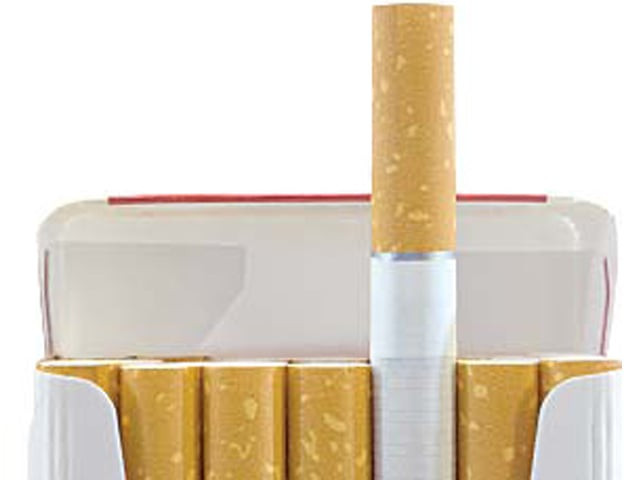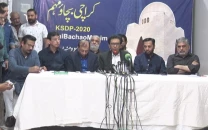World No Tobacco Day: To tax or not to tax
As govt wades in its self-created puddle of anti-tobacco regulations, debate over increase in tobacco taxes continues.

As govt wades in its self-created puddle of anti-tobacco regulations, debate over increase in tobacco taxes continues. PHOTO: FILE
With mounting stressors of modern life, people increasingly find solace in cigarette puffs.
Former law minister, Dr Babar Awan, while talking to The Express Tribune, said, “There are three things that encourage people to smoke. One, when your leaders [in any area of life] are shown smoking; two, the fact that there is absolutely no case of smoking where a public smoking violator is caught and tried; and three, the massive blast of social media.”
In the debate on cigarette smoking, ruralites, who are primary consumers of tobacco, are often overlooked. Dr Awan stated that in the large rural population, use of hookahs and other forms of tobacco is customary. Thus, it seems unlikely that tobacco regulations will supersede a widely accepted practice.
The most recent Statutory Regulatory Order (SRO) 1086 (1) 2013 entirely prohibits advertisements of tobacco products. Dr Awan confirmed that Pakistan is one of the top countries that are heavily legislated in anti-tobacco laws. “Yet, the laws related to control of tobacco companies are non-existent in many ways,” said Dr Awan.
According to associate advocate Mohammad Kamil Jamshed, “The prohibitions have merely provided lip service to an issue that has been classed as a non-priority to the state.” He said that implementation remains weak despite the Supreme Court of Pakistan taking a suo motu notice of the lack of enforcement of the Prohibition of Smoking and Protection of Non-smokers Health Ordinance 2002.
Heavier taxes on tobacco companies: a good idea?
The World Health Organisation’s (WHO) campaign for the World No Tobacco Day 2014 says it loud and proud that “Raise tobacco tax; lower death and disease.” But in the absence of implementation of taxation as a tool, desired effects are not being seen in Pakistan.
A new study titled "The Economics of Tobacco and Tobacco Taxation in Pakistan," backed by the International Union Against Tuberculosis and Lung Disease, makes this clearer. A uniform specific tax that accounts for 70 per cent of the average cigarette price in Pakistan could increase tax revenues by Rs27.2 billion. It could also reduce overall cigarette consumption by 7.5 per cent. This would lead to over half a million users quitting and reducing premature deaths among adult smokers by over 180,000.
While the report is very timely, surfacing merely days before the announcement of the budget for fiscal year 2014 to 2015, some consider it a somewhat myopic view of the tobacco conundrum. “I don’t agree. Another fraud is being committed,” said Dr Awan. “Instead of widening the tax net, they want to impose heavier taxes upon people who are already under the tax burden.”
Co-author of the study and former World Bank vice president, Shahid Javed Burki, said that “The current tax structure, which takes in revenues from tobacco into the general budget, has not helped finance a well-informed tobacco policy.”
Pakistan Tobacco Company (PTC) alone paid Rs60 billion in taxes in the year 2013, which is almost equal to what the salaried class collectively pays as income tax. “The issue is not that tax incidence needs to be increased, but that the existing regulations need to be effectively enforced,” said Hasaan Khawar, head of business development at PTC.
According to Khawar, illicit trade is the biggest problem that tobacco companies face. “It’s not a problem specific to porous borders. Go to any store and you’ll find cigarette packs that don’t carry the graphic health warning. People prefer buying such packets,” he shared.
According to Oxford Economics’ Asia-11 Illicit Tobacco Indicator 2012, Pakistan witnessed 86 per cent consumption of the estimated 24.9 billion domestic illicit cigarettes.
Burki said that Pakistan will not be able to effectively police the borders. “However, taxing does make smuggled goods more expensive and thus, produces one desired objective of increasing cigarette prices,” he said, adding that this would result in curbed consumption.
“Instead of increasing the percentage of tax levied upon tobacco companies, the government should allocate a separate part of the budget to combat illegitimate players,” suggested Aslam Zahid*, who is affiliated with one of the leading tobacco companies. “Enforcement of regulations and better inter-agency coordination is required to combat illicit players,” Khawar recommended.
The study also suggests that new tobacco reforms will prevent 725,000 youth from taking up smoking. Meanwhile, most tobacco companies claim that they focus on the existing base of smokers, so it would be inapt to assume that imposing heavier taxes on tobacco companies can single-handedly prevent Pakistan’s youth from taking up smoking.
*Name changed to protect privacy
Published in The Express Tribune, May 31st, 2014.



















COMMENTS
Comments are moderated and generally will be posted if they are on-topic and not abusive.
For more information, please see our Comments FAQ